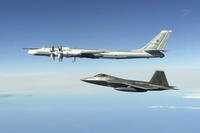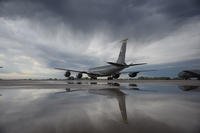National Guard and Reserve personnel preparing for training this weekend may want to make other plans.
The federal government shutdown that started Tuesday has put all National Guard and Reserve training, both monthly and annual, on hold, according to Reserve and National Guard Bureau officials.
"Pretty much everything has stopped," said Army Reserve spokesman Lt. Col. Matt Lawrence.
Army Reserve personnel may not be ordered to active duty except in support of those military operations and activities necessary for national security. This includes activities necessary to meet pre-deployment requirements, according to guidance on the Reserve command's web site.
Guard and Reserve members who started annual training before beginning of the new fiscal year on Oct. 1 will continue training until it's complete, according to officials from Army Reserve Command and the National Guard Bureau.
All scheduled slots for Reservists to attend professional development schools are now canceled as long as the shutdown persists, Lawrence said.
The shutdown has also forced thousands of technicians to take mandatory unpaid leaves of absence because of the government shutdown, officials said.
Days after a budget impasse in Washington, D.C., closed the federal government for the first time since 1996, the Tennessee National Guard ordered more than 1,500 technicians and contract employees to take unpaid leaves, known as furloughs. The Colorado National Guard forced another 650 such workers to do the same.
Nationwide, the Guard has almost 50,000 so-called dual-status technicians --uniformed employees who drill and work alongside active-duty and reserve personnel at arsenals and depots to maintain vehicles and aircraft, and to perform logistics and administrative duties. Many of the workers, who are technically civilians, are now being sent home without pay because of the shutdown.
"The longer this goes on, the more our readiness is put at risk," John Goheen, a spokesman for the National Guard Association of the United States, a Washington, D.C.-based advocacy group, said in a telephone interview.
The postponements of the drills to later this month were likely made in hopes of a short-term resolution to the political gridlock on Capitol Hill. President Barack Obama was set to meet with congressional leaders Wednesday evening to discuss the shutdown.
Congress and the White House agreed at the last minute to continue paying the U.S. military's 1.3 million active-duty troops on time after Oct. 1, the start of the government's fiscal year. Yet many of the more than 800,000 Guardsman and reservists won't be paid unless they're mobilized for a contingency or emergency that's "excepted" from the shutdown, a Pentagon official said.
The law protects the payments to those under Title 10 orders. Reservists who are not activated for more than 30 days fall under Title 32, not Title 10 and are not included in the legislation protecting military pay.
There is also confusion about what compensation is allowed beyond basic pay and allowances for subsistence and housing. The Defense Department, for example, hasn't decided yet whether troops in Afghanistan and other conflict areas will receive imminent danger pay and other incentive pays come mid-October.
Some 54,000 U.S. troops in Afghanistan draw about $225 per month in danger pay.
"No decision has been made," Navy Cmdr. Bill Urban, a spokesman at the Pentagon, said today of the possible delay to special and incentive pays. "It's under review."
Some Republicans in Congress have said the Pay Our Military Act, which Obama signed into law on Sept. 30, is designed to cover all pay and allowances. The legislation references those terms, but doesn't include specific types of compensation.
"Our stance is that when the legislation said pay, it means all types of pay, not just basic pay," Claude Chafin, a spokesman for the House Armed Services Committee, led by Rep. Howard "Buck" McKeon, R-Calif., said yesterday in a telephone interview. "That's our interpretation."
Some have also begun to argue that the legislation covers the military technicians in the National Guard, according to the association.
Gen. Frank Grass, chief of the National Guard Bureau and a member of the Joint Chiefs of Staff, in a post on his Facebook page said the designation is a unique and beneficial part of the Guard.
"Our civilians are essential to the success of our mission and the sacrifice they have been asked to make is not taken lightly," he said.
Grass also responded to criticism that the "dual-status" designation should be reviewed to clarify whether employees are full-time military members or not.
"It's very troubling that despite these benefits, so many of them are affected by this shutdown," he said. "Some positions have been excepted, but I know that is no consolation for those who have not."





























